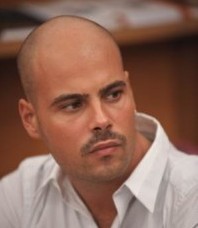
Marco D’Amore is an italian actor that played one of the main roles in “Gomorra the series” tv drama based on famous book by Roberto Saviano that talks about camorra. D’Amore is also a drama actor and he has worked on stage with Toni Servillo and in some movies such as “Perez” with Luca  Zingaretti, actor of the series “Inspector Montalbano”. His character in Gomorra- the series is named Ciro Di Marzio and it has been compared to Iago, well known “villain” from shakespearian “The tragedy of Othello, the Moor of Venice”even though the differences between the two works are many, for example in this case the events don’t take place in Venice and Greece but in Naples and Spain. There are some others resemblances with Shakespeare, for instance the female leading role of Donna Imma ( Lady Imma) played by actress Maria Pia Calzone has been paralleled to Lady Macbeth. I’ve talked with Marco D’Amore about
Zingaretti, actor of the series “Inspector Montalbano”. His character in Gomorra- the series is named Ciro Di Marzio and it has been compared to Iago, well known “villain” from shakespearian “The tragedy of Othello, the Moor of Venice”even though the differences between the two works are many, for example in this case the events don’t take place in Venice and Greece but in Naples and Spain. There are some others resemblances with Shakespeare, for instance the female leading role of Donna Imma ( Lady Imma) played by actress Maria Pia Calzone has been paralleled to Lady Macbeth. I’ve talked with Marco D’Amore about all of this and certainly about theatre and Naples, a marvelous city that is considered a living character.
all of this and certainly about theatre and Naples, a marvelous city that is considered a living character.
The dramaturgy of “Gomorrah” has been compared to the texts of Shakespeare, Donna Imma to Lady Macbeth, Iago definitely looks like Ciro. One thing that is definitely very similar to Shakespeare is that good and evil are equal, we have also seen in “Perez” execrable and ennobling actions are made by the same character. The thing that differentiates Gomorrah by  Shakespeare is the motivation of the characters, in my opinion: Lady Macbeth is driven by ambition and incites her husband to direct action, while Donna Imma is indipendent, she is conscious that she must remain clear headed, otherwise she loses control on the situation. She’s sure of her status because her ambition is
Shakespeare is the motivation of the characters, in my opinion: Lady Macbeth is driven by ambition and incites her husband to direct action, while Donna Imma is indipendent, she is conscious that she must remain clear headed, otherwise she loses control on the situation. She’s sure of her status because her ambition is 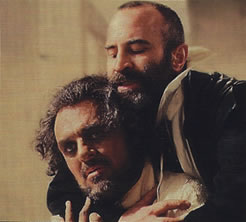 already expressed, she is already at the top. Ciro, on his side, is not moved by ambition, because there is no Cassius who took his place, but by the will for avenge his friend Attilio, although he plays insidious and destructive dynamics the same way Iago does.”
already expressed, she is already at the top. Ciro, on his side, is not moved by ambition, because there is no Cassius who took his place, but by the will for avenge his friend Attilio, although he plays insidious and destructive dynamics the same way Iago does.”
Marco D’Amore: “Let me tell you that back when no one could imagine, I take the right to say that, I did in first person the quote about Iago thinking about my character: I said that this was a vertigo, as it very often happens when you work on a character who is still epic and has a very complex structure by its nature. So in addition to doing research in the real and in fact, to me personally, since my training is definitely theatrical, I very often think about the characters from theatrical literature I’m particularly related to. I compared these two characters, Ciro Di Marzio and Iago, because they are both military, are men of fire: Iago has defined a knight and similarly Ciro Di Marzio is a knight of Pietro. What intrigued me was the psychological component of the two because compared to the role that covered it was obvious how much the quality of the character was much higher. Compared to the character of Imma I think there is an analogy with 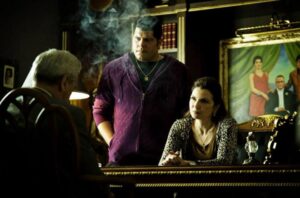 Lady Macbeth because both, on the logic of power, they defend a core that is crucial, that of the family: I don’t think Imma is simply moved by a desire of safeguard, Imma defends a power assumed which is the one of her family. In the same way Lady Macbeth, then with different drifts, takes on the decision-making power when she feels her husband weakness and she must protect her herd, which is small and reduced to herself and her husband, the same way the unit of Imma …”
Lady Macbeth because both, on the logic of power, they defend a core that is crucial, that of the family: I don’t think Imma is simply moved by a desire of safeguard, Imma defends a power assumed which is the one of her family. In the same way Lady Macbeth, then with different drifts, takes on the decision-making power when she feels her husband weakness and she must protect her herd, which is small and reduced to herself and her husband, the same way the unit of Imma …”
It is also a feud, if you will.
M.D’A .: “It is, absolutely. I think there is obviously a distinction because there is an epic of the characters and the story that refers to humanity, here there is more urban condition; But if we don’t do such a sharp a distinction between good and evil, between reality and epic, a much broader description of humanity can also be found in this story and in these characters.”
One thing that unites Gomorrah to classical theater is the apparent absence of choice: it seems like these characters’ path is already drawn. Yet we see that, as we said, that they are aware of what is right, what is harmful, dishonourable. Being aware of that, they are somehow able to make a choice, and yet killing is normal, steal and bag-snatch is nothing important. But it’s like if fate was already decided whatever they do. Here there are no gods: who decides?
“M.D’A .: “There’s a shining divinity and much less high-in emotional and sentimental terms – and much more concrete, that are money. From my point of view, one cannot look at these characters and these events unless in a logic of power. Just power. It is not true that there are no feelings, they exist. It is not true that there are no relationships, there are but they are all always bend the logic of power, absolutely. This is the god of Gomorrah. ”
I’ll give you the same question I asked Marco Palvetti: thirty years of Eduardo, “The inner voices” live with Servillos and Sorrentino as tv director: dedicated ahstag in top trend on Twitter, incredible 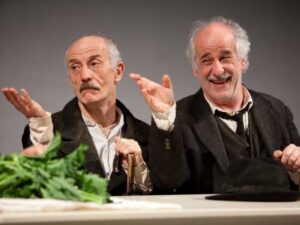 success. On the other side, maybe you’ve seen, there’s a video of Fanpage online newspaper: they went to the street in Naples …
success. On the other side, maybe you’ve seen, there’s a video of Fanpage online newspaper: they went to the street in Naples …
M.D’A. “I saw it.”
That’s it, then: “Eduardo who? relative of Maria De Filippi??” (Italian tv presenter EDD-note). Young people were just 4 or 5 of them but it’s enough and when the reporter says: “well now you apologize with the Fanpage’s readers since you don’t know who  Eduardo is” and then he said:”Come and receive forgiveness“ (a very famous line played by Marco Palvetti as Salvatore Conte in “Gomorrah the series” EDD-note), they understood the reference. Problem No. 1: why there are audiences who are completely unaware of cultural things that are directly connected to them? Second problem: is there
Eduardo is” and then he said:”Come and receive forgiveness“ (a very famous line played by Marco Palvetti as Salvatore Conte in “Gomorrah the series” EDD-note), they understood the reference. Problem No. 1: why there are audiences who are completely unaware of cultural things that are directly connected to them? Second problem: is there 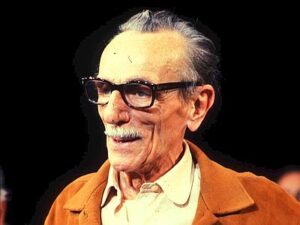 something that culturally doesn’t find any basis to take root and it must be somehow modified, modernized and, if needed, also depleted or lightened?
something that culturally doesn’t find any basis to take root and it must be somehow modified, modernized and, if needed, also depleted or lightened?
M.D’A .: “About the service I’ll tell you two things: first, it’s clear that there must be some “salt and pepper” to make a good service and that the construction in some way reflects the reality but that it’s ad hoc edited, of course … ”
Clear: they don’t show the ones who … but those four or five guys who do not know …
M.D’A .: “Indeed. Memory is a value, when nurtured, handed down and and taught. Eduardo De Filippo, in the mid 70s early 80s, did a masterful procedure, recording in full for tv broadcast all the comedies of “La cantata 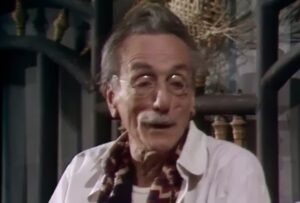 dei giorni pari” and “La cantata dei giorni dispari”. That had been the project of a forward looking man of learning that had realized that audience involvement in theater was getting lost. That was a very specific action to act on reality and to ensure that people didn’t forget. I remember, when I was a child, I watched lots of Eduardo comedies on TV: it’s 15 years I’ve not been seen them aired. Similarly I remember I watched on mainstream tv, in prime time, some of the best movies Italian motion-picture industry has ever produced. Nowadays it’is difficult for a guy of my same age or younger to enjoy on TV, in prime time, on mainstream TV, a film with Volonté or films of Italian cinema of the 70s, from Petri to Germi to many other things, such as the great American cinema. The problem is that, in my opinion: this is a definite cultural orientation that does nothing but impoverish the memory wich dissipates over time and impoverish the cultural knowledge of those who watch and observe; it’s clear that there are things that have no more space and this is a pity. ”
dei giorni pari” and “La cantata dei giorni dispari”. That had been the project of a forward looking man of learning that had realized that audience involvement in theater was getting lost. That was a very specific action to act on reality and to ensure that people didn’t forget. I remember, when I was a child, I watched lots of Eduardo comedies on TV: it’s 15 years I’ve not been seen them aired. Similarly I remember I watched on mainstream tv, in prime time, some of the best movies Italian motion-picture industry has ever produced. Nowadays it’is difficult for a guy of my same age or younger to enjoy on TV, in prime time, on mainstream TV, a film with Volonté or films of Italian cinema of the 70s, from Petri to Germi to many other things, such as the great American cinema. The problem is that, in my opinion: this is a definite cultural orientation that does nothing but impoverish the memory wich dissipates over time and impoverish the cultural knowledge of those who watch and observe; it’s clear that there are things that have no more space and this is a pity. ”
Theater and media: a question that I often do to anyone involved  in theater. You probably know about the experiment Daniele Timpano did with “Aldo Morto 54”, for instance. Or “inner voices” live on tv. Tennesee Williams, or Peter Shaffer –I wrote about his “Amadeus” lately- who also won an Oscar, or Yasmina Reza with Polansky and so on. Must theatre only be “here and now” or it can be a text which can also be translated into cinema and television? Shakespeare, Marlowe, if they had motion picture they
in theater. You probably know about the experiment Daniele Timpano did with “Aldo Morto 54”, for instance. Or “inner voices” live on tv. Tennesee Williams, or Peter Shaffer –I wrote about his “Amadeus” lately- who also won an Oscar, or Yasmina Reza with Polansky and so on. Must theatre only be “here and now” or it can be a text which can also be translated into cinema and television? Shakespeare, Marlowe, if they had motion picture they  would have used it for sure.
would have used it for sure.
M.D’A .: “Definetely. But I think we need to make a big distinction: the theater as it is it’s above all a biological experience and by biological I mean that the same day at the same time in the same place, a number of people are sharing the air, the smells, sweat and spits and consciously decides to join in a fiction and accept that that for two hours that thing is the true reality. So this is the theatrical experience. Then there may be transpositions and drifts, both with the texts that the theatrical drama has given or about the possibility of telling the theater through films, you have mentioned some very high quality examples: last year Roman Polanski’s movie “Venus in fur ” came out, a movie that I loved so much and it’s the second experiment of theatre transposition ,after Carnage, that Polanski does, made through the filter of a great master of cinema that is also able to tell a theatrical experience through the screen.”
Polanski’s movie “Venus in fur ” came out, a movie that I loved so much and it’s the second experiment of theatre transposition ,after Carnage, that Polanski does, made through the filter of a great master of cinema that is also able to tell a theatrical experience through the screen.”
The city of Naples expressed in the fictional depiction of Gomorrah: the city as a character, a character wich is often misrepresented because it’s easy to fall into the misunderstanding  interpretation of a trashy folklore. In Mario Gelardi’s “Gomorrah –stage version” everything takes place in a metal scaffolding as those of construction site, in the movie we see the suburbs: all this gives an international feature to the context. What characterizes both Mario Gelardi’s Gomorrah, yours, or Matteo Garrone’s movie is the
interpretation of a trashy folklore. In Mario Gelardi’s “Gomorrah –stage version” everything takes place in a metal scaffolding as those of construction site, in the movie we see the suburbs: all this gives an international feature to the context. What characterizes both Mario Gelardi’s Gomorrah, yours, or Matteo Garrone’s movie is the  language, because it seems like it could be Caracas or Berlin. You have heard some controversy, like school trips cancelled …
language, because it seems like it could be Caracas or Berlin. You have heard some controversy, like school trips cancelled …
M.D’A .: “But those are jokes! What trips cancelled !? ”
But many people think that in Naples they really live like that. Why the audience who doesn’t know Naples has identified a city that has the largest historical center of Europe just with a suburban neighborhood?
the largest historical center of Europe just with a suburban neighborhood?
M.D’A .: “Well, I think that just hearing the voices and staying comfortably at home thinking to live a quiet life and while problems are elsewhere is very convenient . In this sense Naples is ALWAYS very useful for the rest of Italy because it seems a bit like Naples is jumble of al the problems of this Country  and that elsewhere life is good: it is not like that. Then, I repeat once again: it is IMPOSSIBLE telling naples and certainly is not the intent of this series, because Naples is a kaleidoscope of experiences, ideas, emotions. This series, as well as the film and the piece staged by Mario, rather than the language, rather than the setting, have in common the book by Roberto. The book by Roberto is a book that investigates the criminal organizations from the inside, so inevitably there’s a comparison among the three projects, but there is absolutely no claim to tell
and that elsewhere life is good: it is not like that. Then, I repeat once again: it is IMPOSSIBLE telling naples and certainly is not the intent of this series, because Naples is a kaleidoscope of experiences, ideas, emotions. This series, as well as the film and the piece staged by Mario, rather than the language, rather than the setting, have in common the book by Roberto. The book by Roberto is a book that investigates the criminal organizations from the inside, so inevitably there’s a comparison among the three projects, but there is absolutely no claim to tell 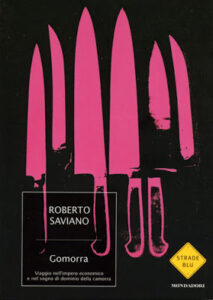 Naples. On the contrary, there’s the intent to demonise what makes Naples a place that could give much more and instead has many limitations. ”
Naples. On the contrary, there’s the intent to demonise what makes Naples a place that could give much more and instead has many limitations. ”
Let’s go back to the language: it was discussed a lot, also about the work Di Vaio has done trying to create a new standard of Neapolitan, let’s say it’s a slightly simplified Neapolitan, not the language you can hear in the streets, which is very difficult. Aside the fact that there were some translation mistakes: there’s a scene where you say: “Stamm pazziann?”  (kidding, joking EDD-note) and is translated as “are we getting crazy” …
(kidding, joking EDD-note) and is translated as “are we getting crazy” …
M.D’A .: “Eheh, ok, it can slip out …”
There were some “Italianization”: there is another scene in which you say something like “‘amm entrà” I would say “‘ amm trasi”. This, however, reflects the reality because there is a real impoverishment of the Neapolitan language that is still full of figures of speech. There are more events: on one hand there are older people who still speak a rich Neapolitan, young people italianize and on the other side is a very poetic and difficult use of the Neapolitan in music. I took the song by Lucariello and ‘Nntò (closing credit song EDD-note) and have it not translated it but paraphrased: it’s a really difficult Neapolitan, full of metaphors. As part of the protection of Neapolitan Language that has just been ratified by UNESCO, do you think that Neapolitan hip hop can be a base for preservation?
M.D’A .: “About Neapolitan language we must make one consideration: Neapolitan language has been expressed before in songs and poetry and after  that it became a popular language. That’s the way it has established. If in this Country we want to talk about LANGUAGES of theater, I think historically there are two: Neapolitan and Venetian, which have been translated in plays, I am referring Goldoni’s experiences the Venetian and those up to the 70s and 80s for the production of Eduardo. About Gomorrah I do ratify a worth to SKY who has ran the risk for a commercial product, aired on national prime time, with a difficult language to understand. It’s clear that is a watered down language because, first of all, it’s difficult to talk about Neapolitan dialect, since there are many: there’s a dialect of the Spanish Neighborhoods, the one of Vomero neighborhood, that of the Vesuvian towns … ”
that it became a popular language. That’s the way it has established. If in this Country we want to talk about LANGUAGES of theater, I think historically there are two: Neapolitan and Venetian, which have been translated in plays, I am referring Goldoni’s experiences the Venetian and those up to the 70s and 80s for the production of Eduardo. About Gomorrah I do ratify a worth to SKY who has ran the risk for a commercial product, aired on national prime time, with a difficult language to understand. It’s clear that is a watered down language because, first of all, it’s difficult to talk about Neapolitan dialect, since there are many: there’s a dialect of the Spanish Neighborhoods, the one of Vomero neighborhood, that of the Vesuvian towns … ”
… Yes, it sometimes changes from district to district.
M.D’A .: “It does. We have tried to create a language that sounded and that was plausibly in those characters mouths, then obviously the language changes, there is an increasingly widespread unknowledge about what the actual Neapolitan dialect is. However, since you have mentioned the song, about the theater it occurs to me to name Mimmo Borrelli, who does a very personal  path about the language that in my opinion is truly fascinating and wonderful; he comes from the towns around Vesuvius. Until the ’70s and ’80s there was a production by Moscato, wonderful and just as charming about the language. So I think that Naples is still in development but always tends to preserve this lexical root that I wish will never be lost. ”
path about the language that in my opinion is truly fascinating and wonderful; he comes from the towns around Vesuvius. Until the ’70s and ’80s there was a production by Moscato, wonderful and just as charming about the language. So I think that Naples is still in development but always tends to preserve this lexical root that I wish will never be lost. ”
Back on Shakespeare, the great genius of paradox: as we see both in Gomorrah and “Perez” ( movie played by Marco D’Amore with Luca Zingaretti, AKA Inspector Montalbano) the characters are both repulsive but also very attractive because they have a lot of money, they gush over their women with gifts and diamonds, armed guards. In their paradoxical essence, if they were not played in Neapolitan, which “actorial device” u would you have to use to make them equally insightful and penetrating?
M.D’A .: “Oh look, I frankly tell you that it would have been difficult because the luck for some actors that have such a strong background on language, is that with talian you already make a path of fiction. Let me explain: for me Neapolitan is the language of thought, I think in Neapolitan, so if I play in Neapolitan I don’t put any kind of filter to language. It would have been  impossible: if you look, for example, “The Wire”, which is a great series that Gomorrah was compared to, the used language is that of the suburbs, Bronx, the one of the neighborhood, which is totally different from everyday slang . In this way you can get across a truth. Conversely it would really be very difficult. ”
impossible: if you look, for example, “The Wire”, which is a great series that Gomorrah was compared to, the used language is that of the suburbs, Bronx, the one of the neighborhood, which is totally different from everyday slang . In this way you can get across a truth. Conversely it would really be very difficult. ”
The cultural lens through various countries have read Gomorrah: clearly the first that made reference to Shakespeare where the Anglosaxons because of Elizabethan theater …
M.D’A .: “No! the first who referred to Shakespear has been me! Long before Gomorrah, everybody took this thing and did headlines! I told it because nobody did! Give me this credit!” ( in Neapolitan EDD-note)
So let’s officially write that you said that and the British have gone after you!
M.D’A .: “Ok! Haha! ”
What other cultural lenses other people have read the work through, like the Germans or the Spanish?
M.D’A .: “First of all, what comes to us from other countries is a confirmation of the fact that this series has raised much attention about Italian products: everyone toasted to a Renaissance because they did not expect that in Italy we could produce such a thing. Beyond content, the first thing that came as an impact was the quality and by quality I mean writing, direction, photography, acting. Then it is obvious that every community has to deal with a product compared to what it lives and what it decides to tell about itself: I can tell you that I had the chance to meet for an entire afternoon the journalists from South American countries, where the series will be soon aired, Chile, Paraguay, Argentina, all of them: at a so distant latitudes there is a closeness to the story that is impressive. ”
acting. Then it is obvious that every community has to deal with a product compared to what it lives and what it decides to tell about itself: I can tell you that I had the chance to meet for an entire afternoon the journalists from South American countries, where the series will be soon aired, Chile, Paraguay, Argentina, all of them: at a so distant latitudes there is a closeness to the story that is impressive. ”
Perhaps for the topic, since it’s mainly about drug trade.
M.D’A .: “Yes, indeed, they recognized their own reality. I think European 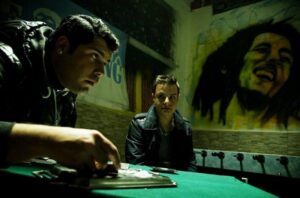 Countries know it, they have much more difficulty in telling it, but they know very well that it’s even of their cities. So I think there were two types of recognition: one on the content point of view and another on the quality, that in my humble opinion is much more important, however, because I would redimension this series to an audiovisual product and that’s it. ”
Countries know it, they have much more difficulty in telling it, but they know very well that it’s even of their cities. So I think there were two types of recognition: one on the content point of view and another on the quality, that in my humble opinion is much more important, however, because I would redimension this series to an audiovisual product and that’s it. ”
You currently have a project on a piece about the problem of eternit, have you?
M.D’A .: “A movie: I’m co-producing it, my first film, with my company called “La piccolo società”. I’m co-producing it with Indiana Production the ones of “Human Capital” by Paolo Virzì that runs for Academy Award. We are preparing, we are in Casale Monferrato, we will film this incident took place; my partner Francesco Ghiaccio, I wrote the script with, will be the director, the leading actors are Matilde Gioli and Giorgio Colangeli. It’s a great story about a father and son in the background of this event that happened almost 5 years ago and, as a legal case, we saw last week how it bitterly has been closed in the court of cassation. So we will raise even more our yell to demand justice . ”
Closing: a playwright, drama script, on which you would like to work, and that you would like to play and American director with whom you would like to work.
M.D’A .: “I have been lucky enough to work hard with Toni Servillo, it may seem obvious that I still name him but I would love to come back to work with him on an important project. I’m not hurt anyone naming him, but there are  many, because my first job and my first joy is being a viewer, both of movies and theater: I admire others’ work and I always follow it. This, about the director. An author I’d investigate and I feel close, that I know because I have studied and continue to, Shakespeare: always in my readings, also repeated on the same text. One of my bumps is to stage a text of Shakespeare in the way I’m interested in because I think it is, after the Greek tragedy, the greatest example of theatrical literature ever produced. ”
many, because my first job and my first joy is being a viewer, both of movies and theater: I admire others’ work and I always follow it. This, about the director. An author I’d investigate and I feel close, that I know because I have studied and continue to, Shakespeare: always in my readings, also repeated on the same text. One of my bumps is to stage a text of Shakespeare in the way I’m interested in because I think it is, after the Greek tragedy, the greatest example of theatrical literature ever produced. ”
American director you like to work with?
M.D’A .: “It is not American but is “lent” to Hollywood cinema: I say Iñárritu.”